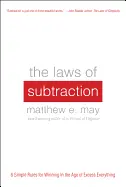
The Laws of Subtraction - by Matthew May
ISBN: 0071795618Date read: 2013-01-09
How strongly I recommend it: 4/10
(See my list of 430+ books, for more.)
Go to the Amazon page for details and reviews.
I'm biased. I'm in it. This is a subject I live. So I flipped through a little fast, thinking, “Yep. I know. Got it. Living it. Yep.” But for those who need some minimalist inspiration, this has some great thoughts in it.
my notes
Poet Fujiwara no Teika:
“The poet who has begun a thought must be able to end it so masterfully that a rich space of suggestions unfolds in the imagination of his audience.”
Work is fun and productive when we’re doing what we do best while those around us are doing what they do best.
It’s not so much fun when we’re doing work that others are better at but aren’t doing because we’ve failed to design the work properly.
If we are wise enough to contemplate our own experiences, we can figure out the square root - what’s at the core - so that we can be not only wise but also heroic in using wisdom to take the right action to make fundamental changes.
Having just one bad apple in a small group can drag down performance by up to 40 percent.
Smaller teams are more effective than larger teams because as group size grows, more attention is devoted to running the group and less to the task at hand.
Vacation policy employed by Netflix, the streaming video and DVD-by-mail company based in Silicon Valley, is audaciously simple and simply audacious. Salaried employees can take as much time off as they’d like, whenever they want to take it. Nobody - not employees themselves, not managers - tracks vacation days. In other words, Netflix’s holiday policy is to have no policy at all.
Since Netflix wasn’t tracking how many hours people were logging each work day, these employees wondered, why should it track how many holidays people were taking each work year?
Rules and policies and regulations and stipulations are innovation killers. People do their best work when they’re unencumbered.
Lao Tzu wrote:
“A leader is best when people barely know he exists; when his work is done, his aim fulfilled, they will say: we did it ourselves.”
Read John Maeda’s book [The Laws of Simplicity]. It’s short and appears not to have much information. It appears simple, but it’s an incredibly complex book.
Subtract the obvious, add the meaningful.
Subtraction can mean the difference between a highly persuasive presentation and a long, convoluted, and confusing one.
In my own experience I’ve noticed that speakers who deliver presentations with fewer words carry themselves better.
They have leadership presence. They’ve internalized the story and are confident about their message.
People who fill their slides with words and bullet points are often unsure of the material and speak with less passion and conviction.